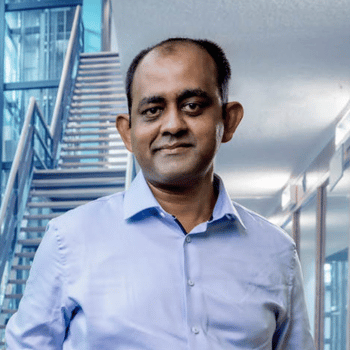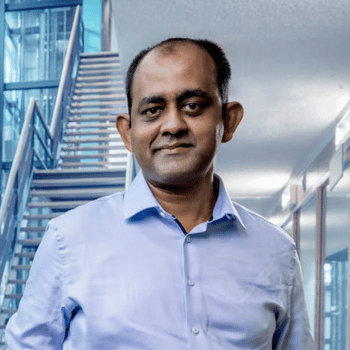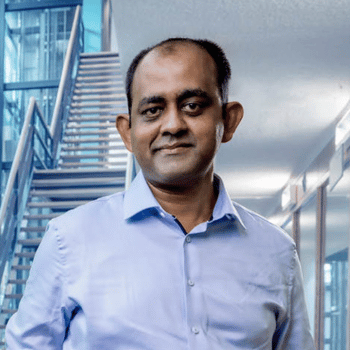
This is our time: TNO spin-off AIKON Health eases the healthcare burden of heart failure
How can we keep our high-quality healthcare available and affordable in the Netherlands? Thiru Kanagasabapathi (CEO of TNO-founded spin-off company AIKON Health) developed a medical wearable that monitors heart failure indicators, substantially reducing readmissions of heart failure patients. It’s an innovation that could play a crucial role in our healthcare in the near future.
Heart failure in the Netherlands
‘The Netherlands has 30,000 new admissions of patients with heart failure every year, which adds up to a total of 800 million euros per year as an additional burden on the health system. Moreover, their care is extremely intensive. A patient diagnosed with heart failure often suffers from shortness of breath and is admitted to hospital. After being discharged, heart failure patients are required to visit polyclinics every fortnight for assessment. This puts a huge burden on the healthcare system. That has to change.’

‘The Netherlands has 30,000 new admissions of patients with heart failure every year, which adds up to a total of 800 million euros per year as an additional burden on the health system.’
The wearable
‘A medical wearable may be a solution. It allows patients to receive care from home, reduces stressful hospital visits and improves quality of life for the patients. The wearable therefore eases the burden on both the patient and the healthcare system.’
‘AIKON Health's medical wearable consists of a combination of 2 wearable devices that can measure parameters very specific for Heart Failure, a device on the chest measures fluid buildup in the thorax and a device on the arm to measure the hemodynamic changes such as cardiac output continuously from patients at the comfort of their home. The wearable continuously monitors the patient as soon as they leave hospital, for a period of 4 to 6 months. Our ultimate goal is to build predictive models or early warning scores to identify patients at risk of readmission and intervene much earlier before the symptoms develop.’

'TNO is 3 to 4 years ahead of competitors in the market.’
From R&D to market
‘We’re currently in the research and development phase, in which we’re collaborating with TNO at Holst Centre. TNO has developed a best-in-class dry electrode technology that enables patients to be monitored at home continuously over a two-week period and offers clinical quality data for the entire monitoring period. That’s really unique in the world.’
‘In 2017, I joined TNO and now I’m CEO of this spin-off. That's incredibly cool. At TNO, you work on the latest and most essential technologies. TNO is 3 to 4 years ahead of competitors in the market.'
'Moreover, at TNO, you can take such a technology to market by creating a start-up, like AIKON Health. That’s incredibly valuable. Of course, we work with other partners on development and validation, as well as with cardiologists and cardiologists nurses who provide us with feedback.’

‘Over half of all heart failure patients are readmitted to the hospital within four months of initial discharge. Our goal is to reduce the number of early readmissions by 25%.’
The future: 25% fewer readmissions
‘The Netherlands currently has 3.6 million residents over 65 years of age (20%), and that percentage is expected to rise to 40% by 2040. With this ageing population, the incidence of heart failure is also increasing. One in six persons is expected to develop heart failure in their lifetime. Heart failure is associated with high mortality rates, with the highest risk immediately post-discharge from the hospital.'
'By remotely monitoring heart failure indicators 24/7, we enable early interventions that promote recovery. Our medical wearables will partly move care from the hospital to home. With this technology, we can reduce the burden on healthcare, increase quality of care, prevent readmissions and improve quality of life for the patients. Our goal is to reduce the number of readmissions of heart failure patients by 25%.’
‘And we’re going a step further. For example, we want to use our wearable device to gather more information about the patients, who are readmitted. It’s known that 50% of them gets readmitted within the first four months, but we don't know which 50%. If we know more about the characteristics of these patients and their recovery process, we can treat them better and prevent many readmissions.’
‘I’ll consider AIKON Health successful when we drastically reduce the number of (re-)admissions of heart failure patients with our solution. We aim to play an important role in the transition from ‘In-hospital’ monitoring to ‘At-home’ monitoring.’
This is our time: Medical wearables for affordable healthcare
Want to know more about TNO's impact on mediacal wearbles?
